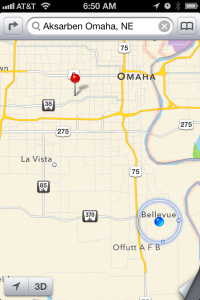“It’s a journey, not a destination.”
Today, that was a friend’s comment on happiness. I’ve heard that said about relationships, about financial responsibility, even about being a whole person who lives the way the Air Force wants its Airmen to exemplify.
I’ve even said this phrase. Two days ago, for the H entry, I mentioned the hope we enjoy, knowing that we can strive for a closer relationship with God and a deeper spirituality. We’ll never arrive at a point where we can say we’re done, but every day, we can take steps in the right direction. I also made the same point about a fitness lifestyle on my other A to Z blog.
With that in mind, today’s joint topic on both this blog and the fitness blog is: the journey.
So what does this really mean?
For me, it means asking not only what goal I have in sight but also where am I actually headed. If we are believers in Christ then it makes sense to say that we will have Christ and some form of Christ-like living as the goal we home in on. But having that as a stated goal doesn’t mean we’re making progress toward it.
Campus Crusade for Christ uses a tract with a graphic meant to depict the difference that takes place in our lives after we accept Christ.
The first picture reflects our state before we were saved, where Self sits on the throne, Christ is out of the picture, and we do as we please. The black circles of various shapes and sizes are meant to portray our efforts and interests. In the first state, we do what we please.
The second shows the idea of a “carnal Christian,” someone who has “faith” as a part of their life but still does what they please. Christ is in the circle, but Self is on the throne.
The last circle puts Christ on the throne and Self at His feet, with interests and efforts balanced, ordered and directed by the Savior, not Self. That’s the ideal for a believer in Christ. That’s part of going on the journey.
But that’s not all. There’s a key point I believe we must understand.
When we think about spirituality, we often assume that the closer you are to God, the more spiritual you must be. A mean-spirited lustful slob of a man is pretty far away from Christ, where we might look at a faithful pastor or public figure and assume they’re pretty near to Christ. This is a faulty assumption. Sometimes the non-believer is more spiritual than the believer. How can that be?
With a journey, it’s not just the goal that matters. It matters how you’re progressing toward that goal.
When my wife and I are headed to a new place in Omaha, we sometimes pop open maps on the iPhone and turn on location services. A little blue ball pops up to show us where we are, and it moves along as we drive. We might be really close to the red ball marking the destination on the map. But if we’re driving away from it, are we better off by virtue of being “on a journey” toward the destination? Of course not. Not at all!
Spiritually speaking, Christ is our destination, and He is moving and doing things in the world around us. Is our little blue marker slowly moving toward Him, moving with Him, orienting to Him, even if we’re on the other side of town? That’s healthy spirituality, recognizing that we may be nowhere near the level we want to be, while keeping focused on how to get there.
On the other hand, we might see Christian figures who are “so godly” in public and yet find out that they stopped moving toward the red location some time ago and started doing their own thing. Maybe they were really close compared to me, but it doesn’t matter, because they aren’t moving toward the goal, staying in line with Christ. They’re driving away.
“It’s a journey” doesn’t simply mean we should enjoy the process along the way. It means we should know where we’re headed, and roughly how we go about getting there. Then we should point ourselves in the right direction and take steps. No matter how far away we are from the mark, if we’re aiming for it and moving toward it, that’s what makes us “spiritual.”


